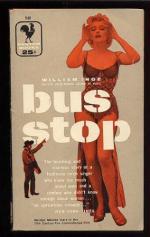|
This section contains 1,373 words (approx. 4 pages at 400 words per page) |

|
Metzger is a Ph.D. specializing in literature and drama at the University of New Mexico. In this essay, she discusses the changing perceptions of Inge's romanticism.
In 1955, Americans were watching I Love Lucy, The Adventures of Ozzie and Harriet, Father Knows Best, and Davy Crockett. In these programs, life was easy; jobs were plentiful, and the American Dream appeared as a tangible reality. It was an idealized image of an America that only existed on televisionand on the stage.
In Bus Stop, William Inge attempts to create a story that is, according to him, "a composite picture of varying kinds of love, ranging from the innocent to the depraved." This was his intent, as stated in the forward to Four Plays, published in 1958. This very sentiment recalls a time in American social history when love and sexuality could be neatly defined and classified. Inge's play...
|
This section contains 1,373 words (approx. 4 pages at 400 words per page) |

|




